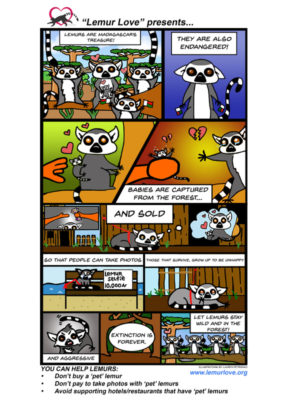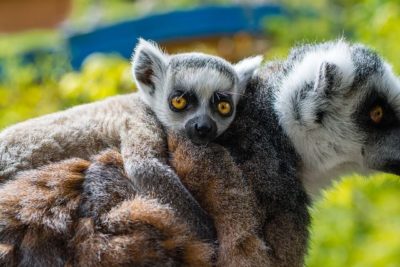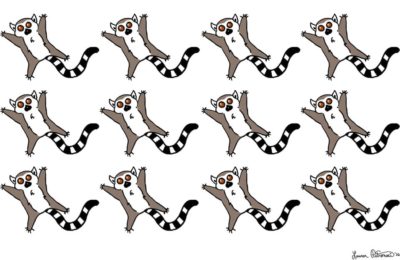The month of November is dedicated to Lemur Love. In this blog post, we interviewed Marni LaFleur, the NGO’s founder and director, who tells us all about their important work and how we can support them.

Tell us a little bit about the history of Lemur Love.
Lemur Love, Inc. was founded by Dr. Marni LaFleur in 2012.
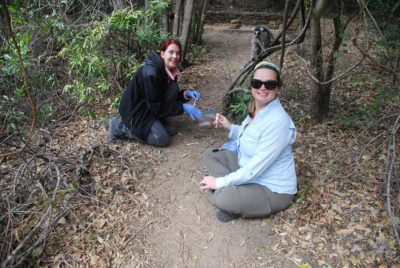
Marni spent 10 months in Madagascar in 2010-2011 while collecting data for her doctoral dissertation and became increasingly concerned about deforestation and the illegal trade of wild-captured pet lemurs.
She started Lemur Love to further scientific research and conservation with wild lemurs. Since then, Lemur Love has grown and expanded to include small scale development within Madagascar and ‘inspiring love for lemurs’ globally.
Where is Lemur Love located and can you please tell us some facts about the NGO?
Lemur Love a US 501(c)(3), based in San Diego, CA, USA. We travel to Madagascar annually to conduct scientific research and conservation in Madagascar.
We are a 100% volunteer organization that values individual animals and people. We mentor Malagasy and foreign students, cultivate lemur enthusiasts, and aim to collaborate with like-minded conservationists.
The Lemur Love Team
The Lemur Love team includes Drs. Marni LaFleur (Founder and Director), Tara Clarke (Director of Outreach), and Jacky Antho Yousouff (Board Member), Ms. Holly Schneider Brown (COO), and Lauren Petronaci (Special Projects Coordinator and artist).
We are also fortunate enough to have Drs. Kim Reuter, Jonah Ratzimbazafy, and Seheno Corduant as advisors to Lemur Love.
Which lemur species do you work with?
Our research focus is on the endangered ring-tailed lemur, Madagascar’s most iconic lemur species. That being said, we are also working to fight the illegal capture and trade of lemurs within Madagascar, which affects over 30 species of lemur including ruffed lemurs, brown lemurs, crowned lemurs, sifaka, indri, and more.
How does Lemur Love help lemur conservation?
Here are some of the projects and initiatives we are currently working on:
#PoopScience
We’re using genetic markers from ring-tailed lemur feces to create a genetic ‘map’ of the locations where ring-tailed lemurs persist in southern Madagascar. We’ve also collected fecal samples from confiscated ex-pet and current ‘pet’ ring-tailed lemurs in Madagascar, and we will soon be able to identify the likely area(s) of capture for the captive animals.
This information will allow us to understand the “hotspots” of capture and develop targeted conservation initiatives that are tailored to the local area, which increases our chances of successfully decreasing cature rates.
 Long-term research ring-tailed lemur research.
Long-term research ring-tailed lemur research.
We’ve been following two groups (ILove and Vintany) of ring-tailed lemurs at at the Tsimanampesotse National Park (TNP) since 2010. We’ve learned about their feeding and ranging behaviors, use of habitat including caves, nocturnal activities, predators, and threats, not to mention their individual personalities!
We hope to secure funding to individually collar the adult ring-tailed lemurs in the ILove and Vintany groups in 2018. Collaring such as this helps us collect detailed individual behavioral data, but also deters would-be poachers from interfering with wildlife.
Unfortunately, we know that the infants of these groups have been poached for the pet trade in the recent past, and we want to protect the animals from further poaching.
Community Development.
In additional to our long-term research with lemurs in TNP, we are working with the local community of Efotse, which is located 5 km from our research base. We’re collaborating with Efotse’s women’s association (“Mirdranasoa”) in order to implement small-scale, sustainable development projects which aim to reduce food insecurity and improve local livelihoods.
We’re very excited to observe Mirdranasoa’s early successes and look forward to watching their current projects develop.
#PetLemurSurvey.
Along with Dr. Kim Reuter, we’re collecting and analyzing data submitted by citizen scientists about sightings of pet lemurs within Madagascar. We have several forthcoming publications including one entitled “Illegal trade of wild ring-tailed lemurs, an Endangered species, within Madagascar”.
Getting the word out about tourism, social media, and illegal lemur trafficking.
Tourism and social media can be effective tools for promoting conservation of wildlife. Unfortunately, “selfie safari” style tourism, wherein tourists have staged up-close interactions with wildlife or pay to interact with wild-captured photo-prop animals, are incredibly damaging to conservation efforts, including those with lemurs.
From our research and experiences within Madagascar, we don’t recommend patronizing or visiting any hotel, restaurant or facility that allows you to directly touch or interact with lemurs (or other endemic wildlife such as chameleons).
Doing so supports often illegal capture of wild lemurs, suffering and death of lemurs following capture, and poor quality lives of the lemurs that survive. And if you share your photos online, this propagates similar ‘selfie safari’ type expectations and behaviors in other travelers.
To be a responsible tourist in Madagascar, please consider only engaging in activities where you see wild lemurs in their natural habitats. This way you know you are positively contributing to tourism and not harming wildlife in the process!
What are some of your recent achievements?
 Responsible Tourism Recommendations in Bradt Travel Guide
Responsible Tourism Recommendations in Bradt Travel Guide
Our recommendations for interacting with lemurs in Madagascar appear in the Bradt Travel Guide Madagascar 12th edition.
Wildlife Conservation Network Expo
We recently (Oct 14, 2017) attended the Wildlife Conservation Network’s Expo in San Francisco, CA. This was our first time attending an event like this as exhibitors, so we enjoyed sharing some of our love for lemurs with fellow conservation enthusiasts.
We also debuted out lemur-themed merchandise at the WCN Expo, which you can find for sale in our Facebook store.
Monkeys and Mountains Adventure Travel collaboration
We are now working with Monkeys and Mountains Adventure Travel and have collaboratively designed a ecotour of Madagascar, which will take place in July of 2018. Over the last several years, Lemur Love’s research has in part focused on the legal and illegal trades of “pet” lemurs in Madagascar, and so when planning this ecotour it was very important for us the NO endemic animals (lemurs, fossa, tenrecs, chameleons, etc.) be exploited for the tour.
We are really very proud to take part in a tour that harms no lemurs!
Our tour guests will not be able to take selfies with lemurs on their shoulders (which we know causes significant suffering in wild-captured lemurs, and further depletes endangered lemur populations), but they will enjoy seeing wild lemurs in their natural habitats, and know that their travel is positively influencing conservation of lemurs.
 What are some goals and expectations you have for the future?
What are some goals and expectations you have for the future?
Protect Ring-Tailed Lemurs in Tsimanampesotse
We are motivated to protect the ring-tailed lemur groups that we study in Tsimanampesotse. To do this we will continue our annual research expeditions, increase monitoring of collared animals throughout the year, and support small scale local development such that local people are less dependant on forest resources for subsistence.
See Decrease in Capture of Lemurs for Pet Trade
We also want to see a decline in the number of lemur species and individual lemurs being wild-captured for the pet trade within Madagascar. This is a large and complex problem, but we aim to increase awareness in tourists and local people, and work with the government towards increased monitoring and enforcement.
Share Lemur Love
Last, we want to continue sharing the Lemur Love. We want people to love lemurs and other endangered wildlife as much as we do, and to act to protect environments globally!
Do you have volunteer opportunities at Lemur Love?
We love lemurs and are actively working conserve lemurs and their habitats in Madagascar! We are also a small organization, which means that your talents and skills go a long way.
We currently need volunteers who are adept at web design, marketing, and fundraising. We have opportunities for volunteers in future research expeditions, but these are limited.
What do you need donations for right now?
- Support for Malagasy students to attend the Malagasy Primatological Society Congress. We’d like to send five in-country university students to present their work at the first annual meeting of the Malagasy Primate Society. These meetings will be held from December 13-16, 2017, in Toamasina, Madagascar.
- Funding to complete the laboratory analyses of our #PoopScience project. We’re so close!
- Funding to collar individual lemurs and implement year-round monitoring of the ILove and Vintany ring-tailed lemur groups at Tsimanampesotse National Park.
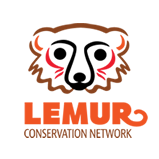
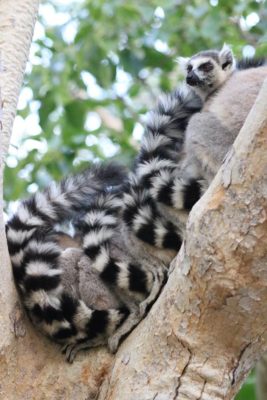
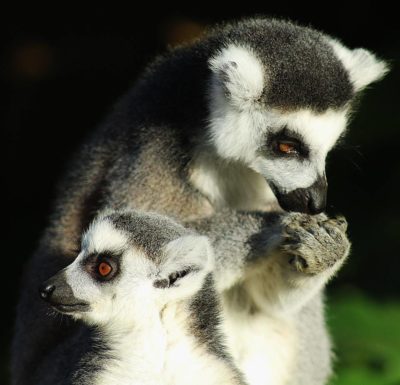 Long-term research ring-tailed lemur research.
Long-term research ring-tailed lemur research.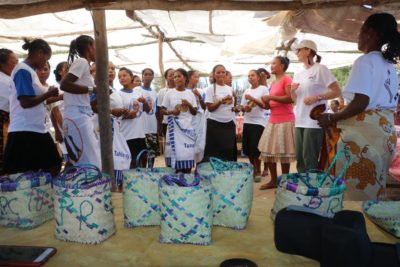
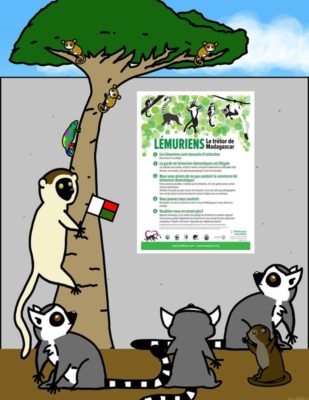
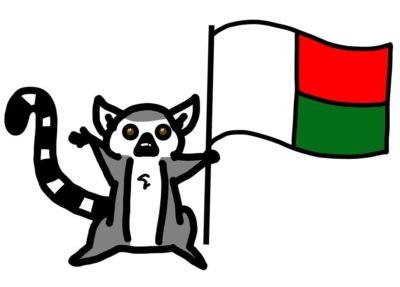 Responsible Tourism Recommendations in Bradt Travel Guide
Responsible Tourism Recommendations in Bradt Travel Guide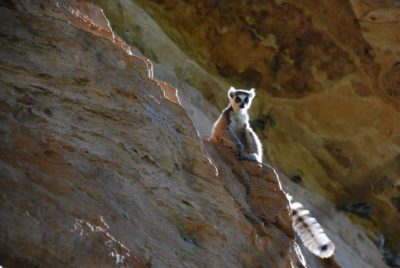 What are some goals and expectations you have for the future?
What are some goals and expectations you have for the future?